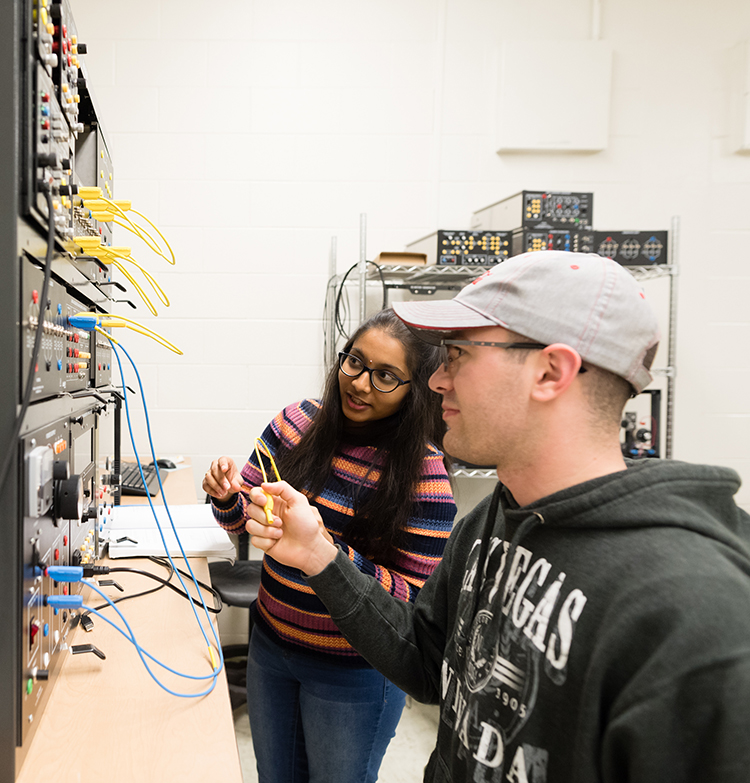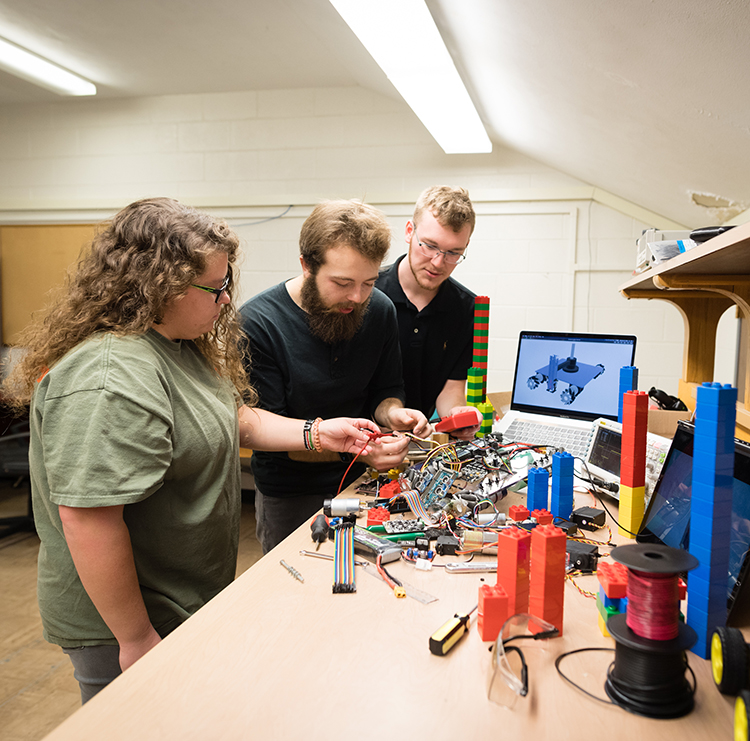Electrical and Computer Engineering
We Power Imagination.
Electrical and computer engineers work at the forefront of technology. They find inspiration to invent, design, build, and test devices that power our everyday world and carry information across the globe. HD TVs, robots and intelligent systems, solar and wind power, supercomputers, the Internet, electric vehicles, computer chips, new computer operating systems, medical devices, smart phones, video games, 5G wireless networks, wireless power transfer– they all have electrical and computer engineers in common.
In addition to getting a strong foundation in the fundamentals, ECE majors have the option of choosing from three additional concentrations:
-
Mechatronics, in which you learn the integration of cutting-edge technology and components in mechanical, electrical, and computer engineering connected by a control scheme. Mechatronics is a vital component in advanced manufacturing and automation, and in modern product design such as robots, driverless cars, and other smart machines.
-
Hardware and System Security combines fundamental principles of computer engineering with in-depth knowledge of hardware design, network protocols, and cybersecurity. Students gain a strong foundation in computer architecture, programming, and algorithms, and learn to identify vulnerabilities, implement countermeasures, and design robust systems. The minor complements the major with specialized knowledge in cryptography, secure protocols, and system-level defenses. Graduates are well-prepared for careers in computer engineering, network security, and cybersecurity consulting, possessing the skills to design secure hardware systems and mitigate security risks in an interconnected world.
-
Vehicle Engineering, which deals with the electronics, controls, safety systems, and vehicle-to-vehicle and vehicle-to-smart grid communications systems in powered vehicles. A specialization in vehicle engineering prepares students to work in the design of hybrid and electric vehicle, as well as connected and autonomous vehicles, with the world’s largest automotive companies who have expanded research and development, testing and production of these vehicles right here in Tennessee.
Electrical engineering and computer engineering majors at Tech have the chance to participate in groundbreaking research with our faculty, in labs designed to replicate experience in industry, helping to contribute to the development of technology to improve the lives of all people.
Take Your Career Anywhere.
 A degree in electrical and computer engineering opens doors to vast career opportunities.
With Tech’s solid foundation in technology problem-solving, you can find a job in
research, design and development, automotive, aerospace, communications, the entertainment
industry, manufacturing—even marketing and management. Many ECEs start their own companies
by applying and taking their ideas and technology in new directions. Plus, the unique
opportunity to conduct research as an undergraduate at Tech, combined with internships
and co-ops, can give you a head start on a rewarding and well-paying career.
A degree in electrical and computer engineering opens doors to vast career opportunities.
With Tech’s solid foundation in technology problem-solving, you can find a job in
research, design and development, automotive, aerospace, communications, the entertainment
industry, manufacturing—even marketing and management. Many ECEs start their own companies
by applying and taking their ideas and technology in new directions. Plus, the unique
opportunity to conduct research as an undergraduate at Tech, combined with internships
and co-ops, can give you a head start on a rewarding and well-paying career.
Lead While Learning.
 Our electrical and computer engineering students are known throughout the Southeast
for their enthusiastic participation in professional organizations and events. The
student chapter of the IEEE (Institute of Electrical and Electronics Engineers) offers
a multitude of social and professional activities, and successfully competes with
other universities in the professional and technical contests offered through the
annual IEEE Southeastern Conference. Officers in the IEEE student chapter and Eta
Kappa Nu, an honor society for electrical engineering students, develop leadership
and communication skills invaluable in today's job market.
Our electrical and computer engineering students are known throughout the Southeast
for their enthusiastic participation in professional organizations and events. The
student chapter of the IEEE (Institute of Electrical and Electronics Engineers) offers
a multitude of social and professional activities, and successfully competes with
other universities in the professional and technical contests offered through the
annual IEEE Southeastern Conference. Officers in the IEEE student chapter and Eta
Kappa Nu, an honor society for electrical engineering students, develop leadership
and communication skills invaluable in today's job market.
Lean More About Our Programs

